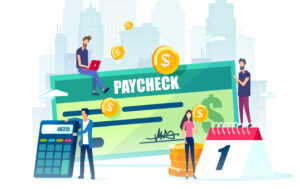-
Provided by

- Date published: Feb 23, 2021
- Categories
The ability to rapidly learn, unlearn and relearn based on new and changing situations has never been more vital to business continuity. Workers are finding themselves in situations where there is limited expertise and no one to guide them with the ‘right’ answers. Learning agility is needed to enable them to be flexible, question biases and shift their mindsets. More than just learning new skills, learning agility is developing a mentality to increase learning capacity and accelerate adaptability.
In this case study, Lisa Lang (head of learning and education, Americas, Siemens) and Mike Bokina (VP human resources, Siemens) share how Siemens has implemented a continuous cycle of learning necessary for the unpredictability of the future workplace and world.
The challenge
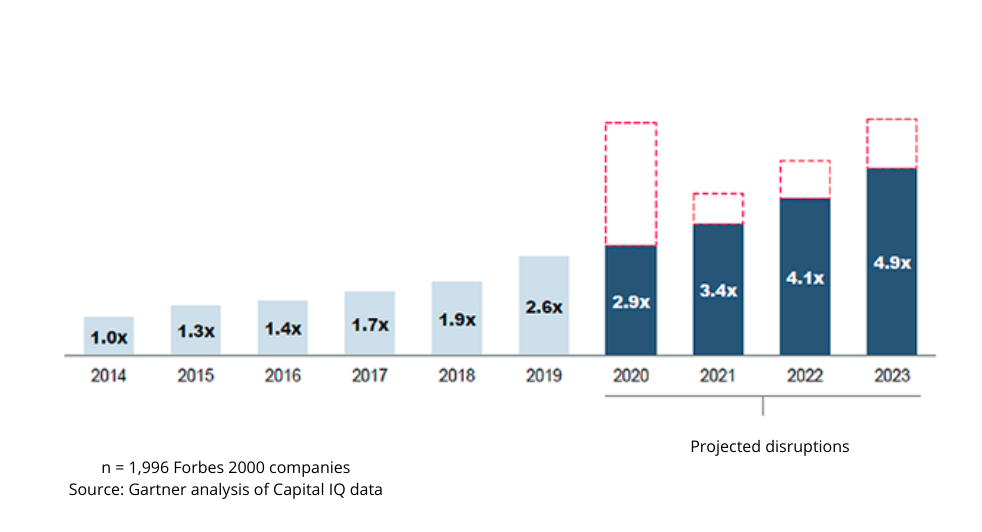
As shown in the chart above, the future of work and skill volatility are heavily influenced by the frequency of disruptions to the business. Of course, COVID-19 has amplified the disruptions as indicated by the red boxes. As a result of this and the impact of artificial intelligence (AI), some leaders believe that 100% of jobs will change within the next five to ten years. In other words, there has never before been a time when learning agility and having the capacity to learn, unlearn, and relearn was needed more than it is today.
More than just learning new skills, learning agility is developing a mentality to increase learning capacity and accelerate adaptability. Siemens has responded by implementing a continuous cycle of learning necessary for the unpredictability of the future workplace and world.
With skills becoming obsolete before you know it, employees must constantly develop and grow to remain relevant in the workforce. For decades, we’ve had the capabilities to deliver learning in a digital format, but the usage and acceptance of this channel has been relatively low. At least until 2020, when the pandemic quickly shifted our lives into a long-lasting virtual experience.
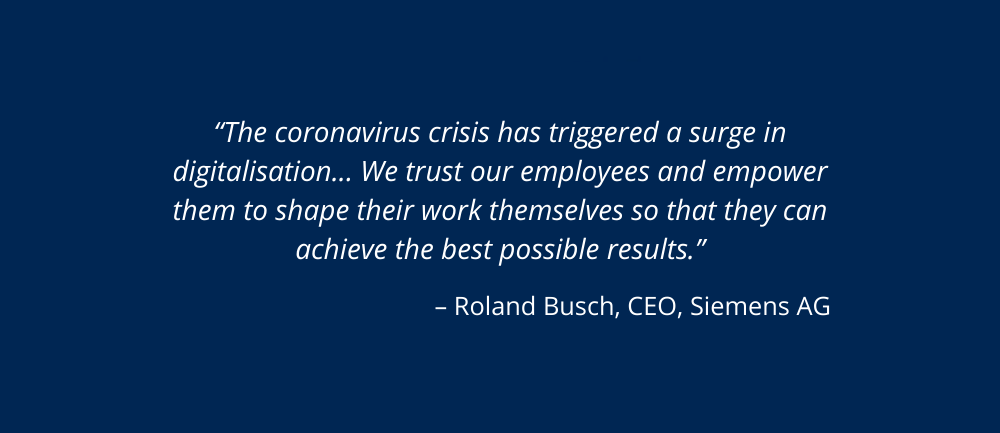
Siemens’ senior leadership made a bold decision to transform the traditional office corporate culture into a work environment that is more digital, remote, and flexible. This year the company announced ‘New Normal’, which means that employees will permanently be working remotely at least 2-3 days per week beyond the pandemic.
This transition has shifted the way that managers guide performance, how that performance is measured, and how employees are developed. Remote working requires a different leadership style that is outcome-focused. Additionally, this initiative requires that we trust and empower our employees to achieve the best results. Some managers have shifted to this new way of managing more swiftly than others and it’s still a work in progress to help managers with this change in mindset and action.
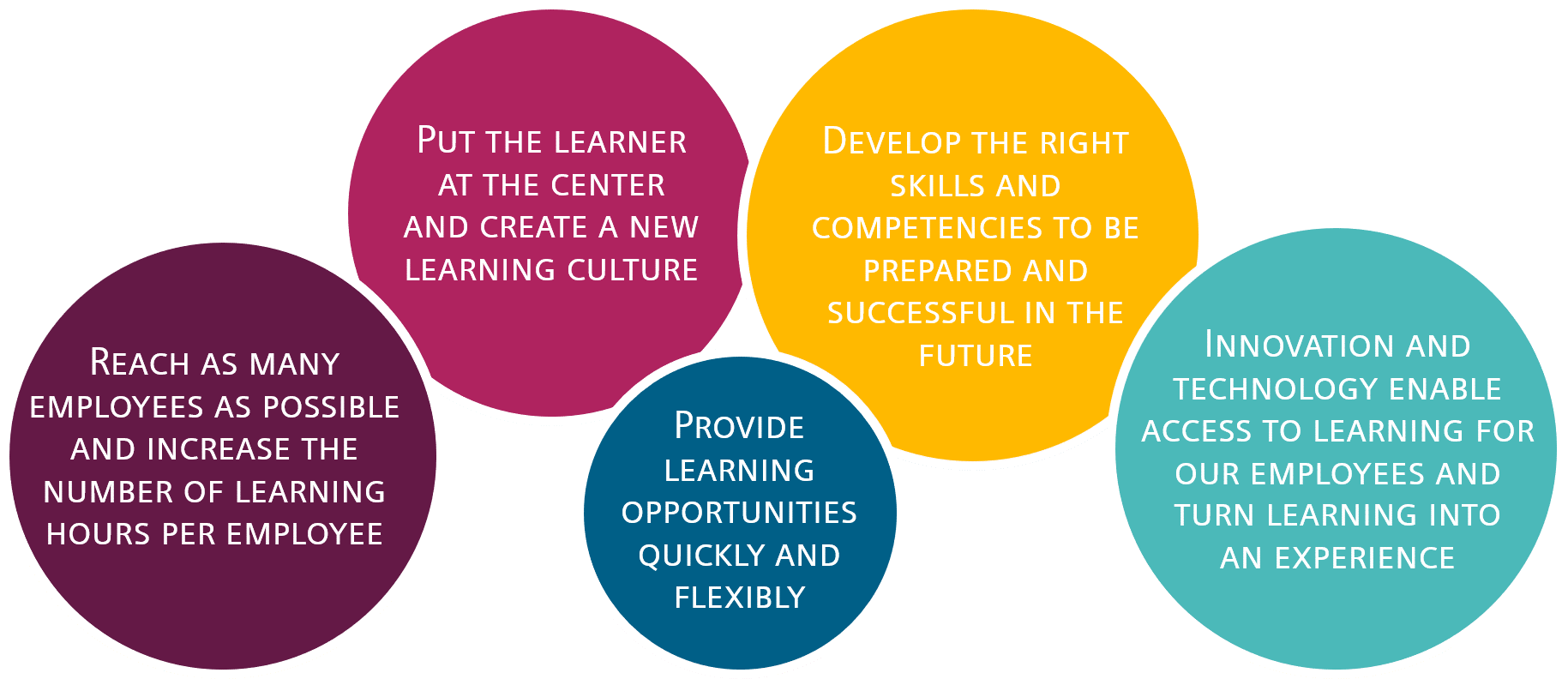
What we did
How do we address developing our employees? The power lies in creating and nurturing a learning ecosystem. Siemens came up with a strategy to create a future-focused learning ecosystem that takes into consideration what we do about the future of work, the New Normal, and how these factors will affect the need for reskilling and upskilling.
There are a number of important elements to this strategy, and they include:
- Reaching as many employees as possible
- Increasing the number of learning hours per employee
- Making learning a more personal experience for employees
- Creating opportunities for learning to be obtained very quickly and in a flexible way
- Building learning content that is based on skills needed in the future
- Using technology to enable learning to be more personal, flexible, mobile, and engaging.
This is the basis of our digital strategy for learning at Siemens.
However, digital learning is not only about having the right tools, platforms, and content. It’s critical that employees have the right mindset and that Siemens creates the right culture for learning.
‘My Growth’ is a culture change initiative at Siemens that provides resources for learning and career development. This initiative was driven by senior leadership commitment to encourage learning and career ownership in a powerful way. To meet the need for new skills and to do this in the New Normal, we believe we must be “always learning and always growing” at Siemens.
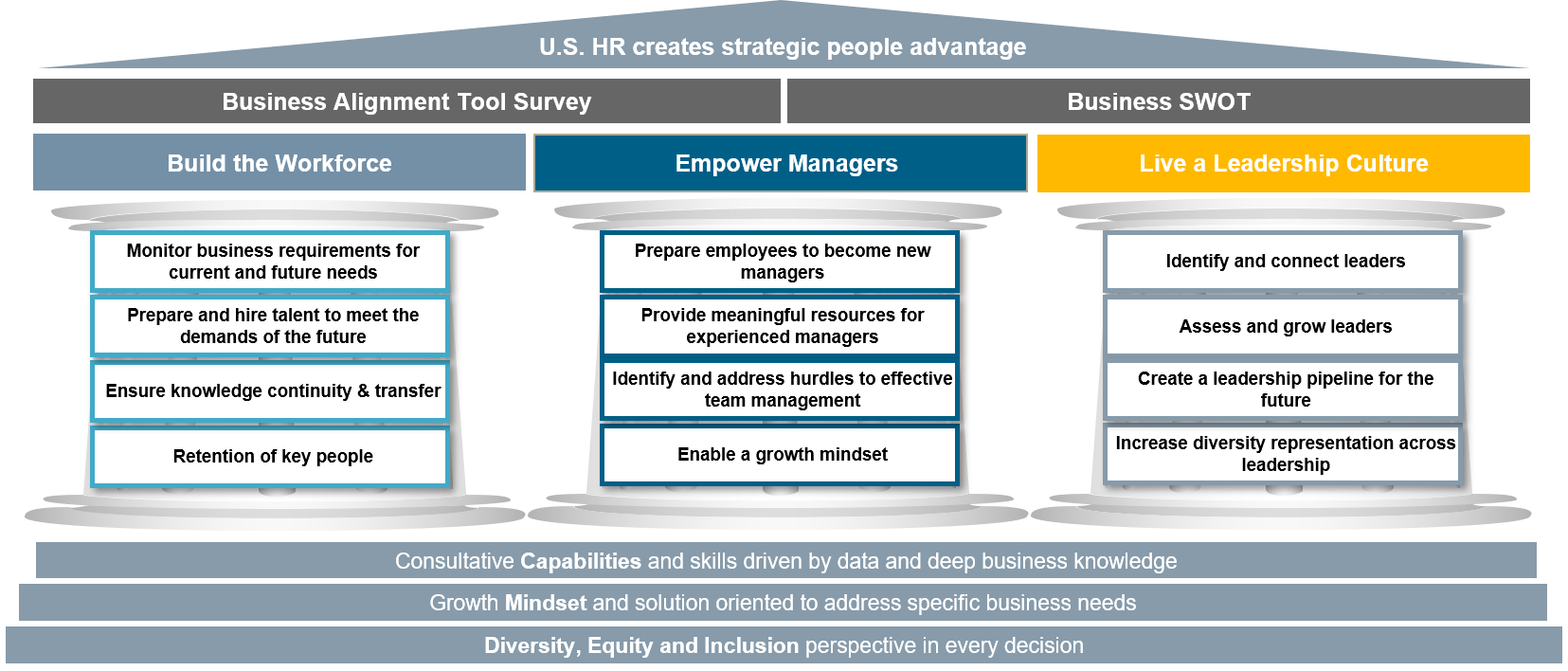
The Siemens US HR strategy was focused on three initiatives in 2020: Build the Workforce, Empower Managers and Live a Leadership Culture (see image above).
With Empower Managers our intent is to support new managers with resources and get them started on the right foot while also addressing the needs of experienced managers and team leaders. We built a digital learning channel that was based on a leadership compass that organises resources around four main categories: Develop, Care, Engage, and Focus. We also provided Leadership Habit guides and tip sheets to help managers put what they learned into action.
Of course, the foundation for the entire strategy is based on embodying a growth mindset, leveraging consultative capabilities within HR, and embracing a diversity, equity and inclusion (DEI) perspective in everything we do.
Bringing learning to life
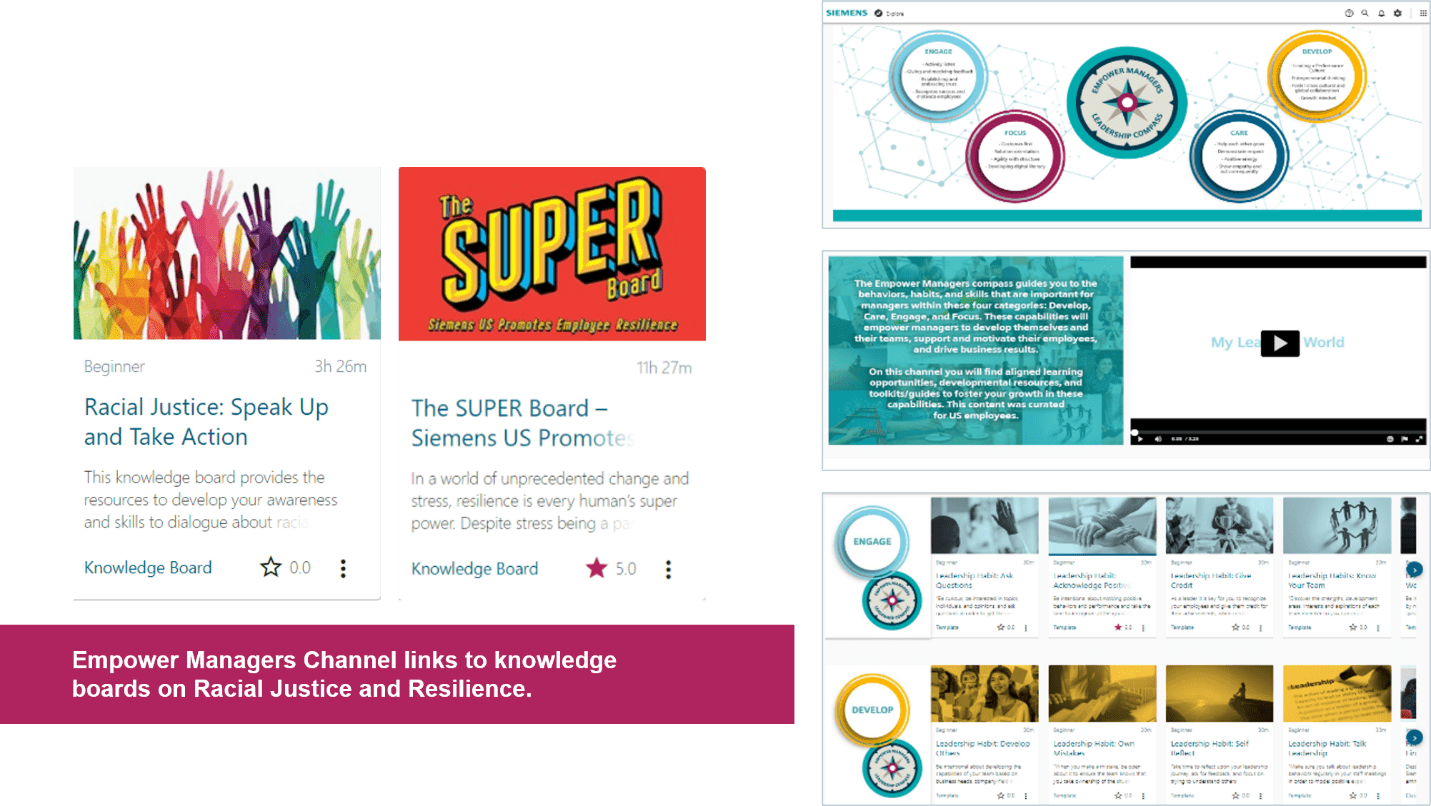
This year we launched our Learning Experience Platform (LXP), My Learning World, and this is the central component of the learning ecosystem. We finally had a new way to dynamically address learning needs and knowledge sharing. The businesses and functions outside of learning could finally build their own online knowledge boards and channels on the LXP, increasing their sense of ownership and engagement in learning. The learning ecosystem allowed us to swiftly provide curated resources and address strategically important topics such as racial justice, resilience, and empowering our managers to lead in the New Normal.
Our DEI strategy shifted in response to social events; racial justice became an urgent topic in response to tragic events and protests that were occurring around the country. Serious conversations and self-reflections were happening in the workplace and employees needed to know what Siemens stood for and how was it going to help employees navigate these topics.
The learning team and our Head of DEI in the US partnered to create, curate and organise resources for our employees. Our LXP allowed us to quickly upload resources onto a digital knowledge board that could be curated on an ongoing basis and provided resources to develop awareness and skills to dialogue about racial justice in the workplace and beyond.
Remote work adjustments, home schooling and isolation really brought resilience to the forefront of topics concerning employee wellbeing. An HR project team created the SUPER Board (Siemens US Promotes Employee Resilience). In this instance, a cross-functional team of HR colleagues curated content and built a digital knowledge board to support employees and managers to build resilience and leverage the best free resources we have internally and externally to Siemens.
Empowering managers was an important part of our people strategy this year and we created an LXP channel focused on management and leadership to solve this challenge. It was a true collaboration project among learning, HR business partners, and business stakeholders to bring this to life. We even engaged a marketing agency to help with design and digital collateral.
Building the platform and creating the knowledge boards and channels only goes so far – we had to drive awareness and drive employees to explore the resources. We partnered closely with communications and our learning partners come up with ideas on how to drive engagement.
These activities included fun contests, stories that featured employees focusing on growing and learning, virtual roadshows on how to use the LXP, and social media events for HR to have a space to share their perspectives.
How we’re aligned with the board
For a global company like Siemens, it is critical to have support from both the German headquarters and US, where we have over 50,000 employees across all Siemens businesses.
The New Normal is a concept that came straight from the managing board and we have a strong advocate in our new CEO, Roland Busch. He has been deeply involved in our global Learning of the Future strategy in the past year.
Prior to becoming the CEO, he served as the global CHRO. While in that role, he recognised the value of our human capital and promoted the importance of developing key skills in the future. His mindset towards development will continue to shape Siemens in the years to come.
Additionally, Barbara Humpton, our US CEO, has been a champion of learning, reskilling, and upskilling for our US employees. For the past two years, Barbara has served on the American Workforce Policy Advisory Board (AWPAB). She joined other Fortune 100 CEOs, governors, and non-profit leaders on the 25-member federal policy advisory board and co-led a working group focused on employer-led training.
More recently, she has promoted the My Growth initiative focused on learning and career development through various communications and events, and was interviewed on video by Mike Bokina, US CHRO. We also recorded videos between our US CHRO and the key US operating company business leaders to promote New Normal across our employee base.
Key learnings so far
Although we’ve come a long way in this journey to digitise the experience for learners, there is a lot more we need to do to prepare our employees for the future of work:
- We will increase our focus on a skills-based approach for the most critical topics (customer, people, technology, growth mindset)
- We will make learning more engaging by incorporating a collection of global certifications and a badging concept
- We will take a more cohesive, comprehensive approach to learning that will connect the various learning organisations internally and externally so that we have a more fully networked ecosystem
- We realise that communications and change management will be critical to make our digital learning approach ‘stick’ beyond the pandemic.
As Siemens is moving into partial remote work with the New Normal, helping to build employee resilience, and weaving diversity, equity, and inclusion into all that we do, it’s important to integrate these elements into our workforce development approach. Our vision with the global Learning of the Future strategy is to enable the employee learning experience to more modular, easily consumable, integrated into everyday work, and flexible and adaptable to business disruptions.
Alvin Toffler wrote that, “The illiterate of the 21st century will not be those who cannot read and write, but those who cannot learn, unlearn, and relearn”. For employees and managers to be prepared to solve increasingly complex problems in a constantly changing organization, they must be continually learning, developing, and growing. Siemens is committed to cultivating this mindset of learning agility and to creating a new culture of learning and career development.
Ultimately, we recognise that the growth and development of our people is essential to Siemens’ success. Because when our people grow, Siemens grows.

